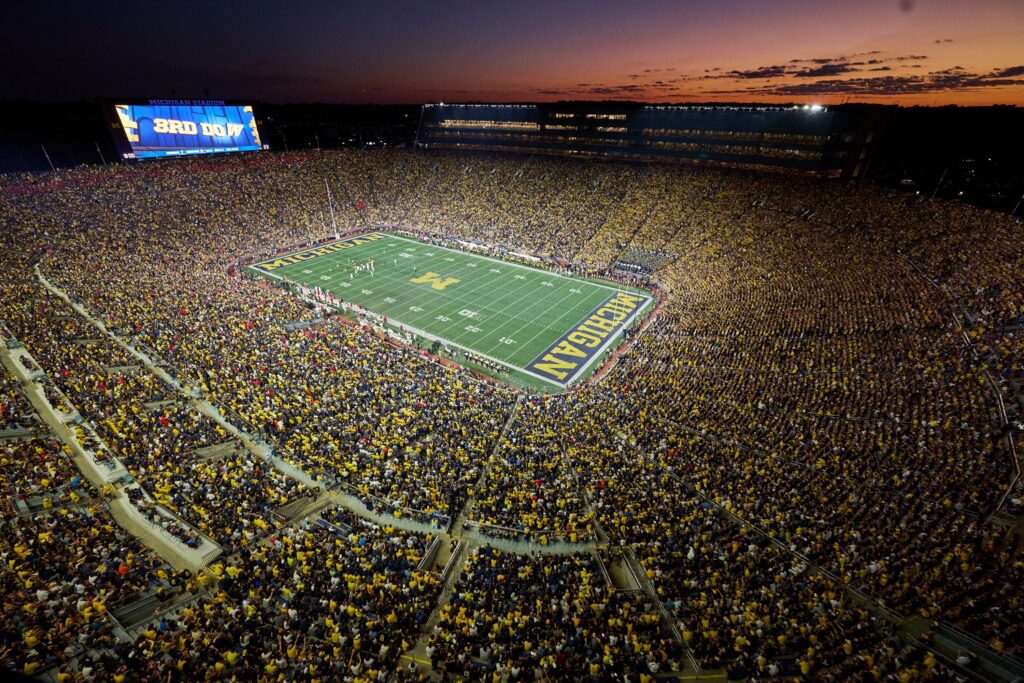
Zach Bryan’s concert on September 27, 2024, at Michigan Stadium in Ann Arbor is poised to shatter the record for the highest attendance at a U.S. concert outside of festivals. With an expected crowd exceeding 112,000 attendees, this event marks the first concert ever held at the 98-year-old Michigan Stadium, commonly referred to as the Big House.
The concert is the culmination of years of planning and discussions led by Rob Rademacher, chief operating officer of Michigan Athletics. Many had long speculated why the stadium, the largest in the Western Hemisphere, had never hosted a concert. The prevailing sentiment among event promoters and university officials was that the stadium lacked the necessary infrastructure for large-scale productions.
Rademacher explained, “It’s not a modern stadium and all that comes with that. We’ve got one tunnel with a low ceiling and not a lot of width. That brings a lot of cost and complexity. We needed the right partner to help us figure that out.”
Efforts to make the concert a reality gained momentum in recent years, fueled by the evolving landscape of college athletics and the financial challenges stemming from the COVID-19 pandemic. Athletic departments nationwide began seeking new revenue streams, which prompted the University of Michigan to revisit the idea of hosting concerts.
In 2024, a pivotal introduction led Rademacher to Gregg Latterman, a music industry veteran and instructor at the university. Latterman was instrumental in connecting Rademacher with AEG Presents, one of the largest concert promoters in the country. “We got to this introduction to AEG, and it went from 0 to 100 in a matter of weeks,” Rademacher noted.
A concert plan quickly took shape, with Zach Bryan being identified as a fitting headliner. His previous performances had demonstrated a strong draw, particularly a sold-out show at Ford Field in June 2024. The partnership with AEG provided the necessary expertise and resources to navigate the logistical challenges of staging a concert in a facility designed primarily for sports.
To break the existing U.S. concert attendance record of 110,905 set by George Strait in 2024, planners designed the stage to be positioned at midfield, allowing for maximum visibility and capacity. “Kudos to Zach Bryan and his team for saying, ‘Yeah, let’s get after it,’” Rademacher remarked.
The announcement of the concert came as a surprise to many fans. Tickets went on sale just two days after the public reveal, with a presale for university alumni selling approximately 66,000 seats in one day. The remaining tickets were quickly snapped up, resulting in a sellout total of over 112,000 fans. Bryan expressed his gratitude on social media, stating, “You guys just sold out the biggest ticketed show in American history. I owe you my life, my humility and every ounce of effort I have.”
As Michigan Stadium prepares for this historic event, excitement is palpable. Rademacher, who attended a recent Bryan concert at MetLife Stadium in New York, has been closely involved in the preparations. Crews began setting up the stage and protective flooring for the stadium’s turf, ensuring everything is in place for a seamless experience.
University officials are aware of potential challenges, including traffic and parking, as they anticipate accommodating a crowd unfamiliar with the stadium’s game-day traffic patterns. Rademacher urges patience, emphasizing the importance of a smooth operation for this landmark event.
Looking ahead, the university hopes that this concert will pave the way for more events at Michigan Stadium, especially in light of the increasing economic pressures on collegiate athletic programs. “Our goal is to do more of this. There’s increased pressure on athletic departments because of [player] revenue sharing and those sorts of things,” Rademacher explained. “So we want to make sure we take advantage of every opportunity.”
As the countdown to the concert continues, the University of Michigan stands on the brink of a new chapter in its storied history, one that could reshape its relationship with the music industry and redefine the role of its iconic stadium.






